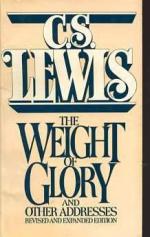
|
| Name: _________________________ | Period: ___________________ |
This quiz consists of 5 multiple choice and 5 short answer questions through Transposition.
Multiple Choice Questions
1. When discussing how we should decide a question of morals, Lewis states that every moral judgment involves all but which of the following?
(a) Intuition.
(b) Precedent.
(c) Facts.
(d) Reasoning.
2. In "Why I am Not a Pacifist", what does Lewis say is the first of three possible ways to interpret the command to turn the other cheek?
(a) Exceptional cases.
(b) Literal interpretation.
(c) Pacifist approach.
(d) Minimizing approach.
3. In "The Weight of Glory", Lewis says nineteen out of twenty men today would respond that what is the highest of the virtues?
(a) Love.
(b) Humility.
(c) Courage.
(d) Unselfishness.
4. If asked about the greatest virtue, as discussed in "The Weight of Glory", Lewis says the great Christians of old would have responded with which answer?
(a) Love.
(b) Unselfishness.
(c) Humility.
(d) Courage.
5. When discussing mental exercises to defend the scholar against war, what does Lewis give as the first enemy?
(a) Excitement.
(b) Fear.
(c) Love.
(d) Frustration.
Short Answer Questions
1. What is the first Pacifist position ruled out by Lewis in "Why I am Not a Pacifist"?
2. What is Lewis's response when faced with those who claim the Christian life is a mercenary one?
3. In his discussion of duty during war, Lewis says anyone who completely gives himself to a cause is giving to _______ that which belongs to God.
4. When exploring analogies for the Christian life, Lewis finds that his chosen analogy breaks down where?
5. In the description of the promises of scripture about heaven, Lewis says which of the following?
|
This section contains 328 words (approx. 2 pages at 300 words per page) |

|




